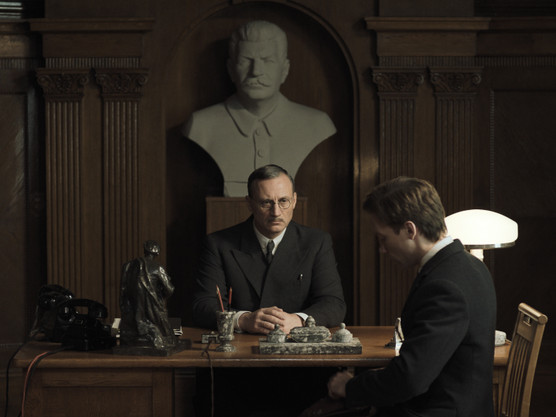Two Prosecutors, the latest film from Ukranian director Sergei Loznitsa, opens with a title card both perfunctory and pointed: “1937, the Height of Stalin’s Terror.” Such a characterization reverberates throughout a film that rigorously examines Soviet corruption during the rank-cutting of the Great Purge. Tonally, though, it’s something of a feint, as the film eschews high drama to examine a terror of the everyday; more specifically, it asserts that to live in Stalin’s Russia was to intimately know a kind of terror in which any word spoken out-of-turn could cost one their life. Over the course of the film’s two hours, we follow Kornyev (Aleksandr Kuznetsov), a newly-appointed prosecutor learning how to navigate the culture of complicity that pervades the People’s Commissariat for Internal Affairs, a secret police force known as the NKVD. Kornyev’s ignorance of this type of “Communist justice,” as one official wryly describes it, makes him something of a neat-fitting audience surrogate. Loznitsa’s primary insight here rests in the appalling gap between the high-minded rhetoric of the Soviet project and the sordid violence by which it was implemented; perhaps it follows that an inexperienced ideologue like Kornyev would still be seduced by the former. Yet Kornyev’s blinkered perspective is emblematic of Two Prosecutors’ forbidding narrative logic. Any time you question Loznitsa’s methods, you’ll get the same answer he does: “That’s how things are, laddy.”
The film’s plot—as stark and unembellished as Loznitsa’s tightly-framed compositions—kicks off with Kornyev arriving at a detention center in Bryansk. He’s come to investigate the status of an aging current prisoner (Aleksandr Filippenko) who insists that he only confessed to the crime of “Anti-Social Behavior” (ASB, for short) after being savagely beaten into doing so. Named Stepniak, he was charged for speaking out against the NKVD’s brutal methods and is a former prosecutor himself (hence the film’s title), another neat trick on Loznitsa’s part that allows his inevitable meeting with Kornyev to impart not just truths about his own abuse at the hands of the state but those which may befall his younger counterpart if he doesn’t tread lightly. The film’s most memorable images are wrought from the gruesome realties of Stepniak’s agony: he requested Kornyev’s services in a letter written with his own blood, hauntingly seen in the film’s opening scene, and his subsequent disrobing during their meeting reveals lesions on his extremities and an unattended abscess near his rib cage (one of his legs has also been amputated below the knee, hence why the other prisoners call him “Pegleg”). In his only scene in the film, Stepniak’s thoroughly recounts the extent to which Stalinism has bastardized the Bolshevik dream. Spearheaded by a withered but stately Filippenko, it’s an astonishing, devastating sequence that provides the film an indelible moment: here in this squalid cell lay the entire story of the Soviet Union, with the idealogue left staggered when confronted by the decrepit, battered man he’s fated to become.
Kornyev is too green to greet Stepniak’s revelations with anything other than outrage, as he endeavors to take up the latter’s case with the party higher-ups in Moscow. The film’s second half depicts this long-winded journey, which is beset by setbacks. It’s also where Loznitsa best weaponizes his film’s deliberate, trudge-like pacing, with the lack of action onscreen (Kornyev spends a lot of time on trains and in waiting rooms—sometimes literally falling asleep after seemingly endless waiting—hoping to bring Stepniak’s case up another bureaucratic rung) reflecting the inertia that awaits those attempting to reform a corrupt system from within. Eventually, he reaches Procurator General Andrey Vyshinsky (Anatoliy Beliy), making an impassioned plea to intervene. Vyshinsky’s sphinxlike comportment belies the sense that such appeals can still sway a well-tenured apparatchik, as their meeting ends with some form of redress still tenuously possible. Yet that opening title card—to say nothing of the historical record—should give a sense of how seriously we should ultimately take Vyshinsky’s considerations. The film’s vision of Soviet governance is as scathing as it is didactic, as Loznitsa’s formidable rigor results in a narrative of ceaseless Sisyphean struggle that plays like a one-note dirge. Men like Kornyev can only fight for so long before they, too, must decide to capitulate to “the way things are” or suffer Stepniak’s fate. There’s no middle ground, neither for Kornyev nor the viewer.
Which is not to say that Two Prosecutors is unconvincing; quite the opposite, actually. The film assures you again and again of the hellish existence one could only hope to eke out under Stalin’s regime and of corrupt institutions’ capacity to obstruct the very changes they need. The inevitable descriptor of “Kafkaesque” has been a common early reaction to the film here at Cannes, apt given the currents of pitch-black humor that occasionally puncture the film’s all-consuming fatalism. But it’s also a bit too easy, as it overlooks some of Loznitsa’s more calculated narrative decisions. An essential element of something like Kafka’s Metamorphosis was that its cursed protagonist was an everyman, complete with his own betrayed sense of personhood and fraying but loving relationships. Kornyev, on the other hand, is clocked as a naïf by virtually all who cross paths with him; it’s even suggested, near the film’s brusque end, that this man of roughly 30 (Kuznetsov is 32) is not only unmarried but likely a virgin. Unaware of the status quo and conveniently solitary, this is less a character for Kuznetsov to play than a device Loznitsa can plug in and hit the same, undeniably effective dramatic beats at will. This airtight approach deflects any number of fair criticisms, not just about the credulity-straining limits of what Kornyev knows but also of the film’s attention-straining slowness. The tedium is the point, one that is well-taken and then some; that does not preclude this accomplished film from also slipping into a punishing tedium of its own. Cannily putting the viewer through the same ringer as its straw-man protagonist, Loznitsa meets autocratic terror where it’s at.

